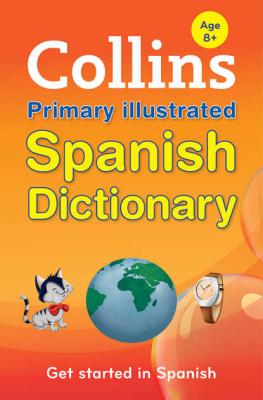Collins Primary Dictionaries. Collins Dictionaries
Чтение книги онлайн.
Читать онлайн книгу Collins Primary Dictionaries - Collins Dictionaries страница 62
 tengo ni idea. I have no idea.
tengo ni idea. I have no idea.
ideal (FEM ideal) ADJECTIVE
ideal Es el lugar ideal para las vacaciones. It’s the ideal place for a holiday.
idéntico (FEM idéntica) ADJECTIVE
identical Tiene una falda idéntica a la mía. She has an identical skirt to mine. Es idéntica a su padre. She’s the spitting image of her father.
el idioma NOUN
language Habla tres idiomas. He speaks three languages.
idiota
idiota can be an adjective or a noun.
A (FEM idiota) ADJECTIVE
stupid ¡No seas tan idiota! Don’t be so stupid!
B MASC/FEM NOUN
idiot
la iglesia NOUN
church Voy a la iglesia todos los domingos. I go to church every Sunday. la Iglesia católica the Catholic Church
ignorante (FEM ignorante) ADJECTIVE
ignorant
igual
igual can be an adjective or an adverb.
A (FEM igual) ADJECTIVE
1 equal Se repartieron el dinero en partes iguales. They divided the money into equal shares. X es igual a Y. X is equal to Y.
2 the same Todas las casas son iguales. All the houses are the same. Es igual a su madre. She looks just like her mother./ She’s just like her mother.
Language tip
ser igual a has two meanings. It can be translated as to look just like and to be just like.
Tengo una falda igual que la tuya. I’ve got a skirt just like yours.
Me da igual. I don’t mind.
B ADVERB
1 the same Se visten igual. They dress the same.
2 maybe Igual no lo saben todavía. Maybe they don’t know yet.
3 anyway No hizo nada pero la castigaron igual. She didn’t do anything but they punished her anyway.
igualmente ADVERB
the same to you ¡Feliz Navidad! — Gracias, igualmente. Happy Christmas! — Thanks, the same to you.
ilegal (FEM ilegal) ADJECTIVE
illegal
la ilusión (PL las ilusiones) NOUN
dream Mi mayor ilusión es llegar a ser médico. My dream is to become a doctor. Le hace mucha ilusión que vengas. He’s really looking forward to you coming. Tu regalo me hizo mucha ilusión. I was really pleased with your present.
la imagen (PL las imágenes) NOUN
image Han decidido cambiar de imagen. They’ve decided to change their image. Es la viva imagen de su madre. She’s the spitting image of her mother.
la imaginación (PL las imaginaciones) NOUN
imagination Tiene mucha imaginación. He has a vivid imagination. Ni se me pasó por la imaginación. It never even occurred to me.
imaginarse VERB
to imagine Me imagino que seguirá en Madrid. I imagine that he’s still in Madrid. ¿Se enfadó mucho? — ¡Imagínate! Was he very angry? — What do you think!
imbécil (FEM imbécil) ADJECTIVE
stupid ¡No seas imbécil! Don’t be stupid!
imitar VERB
1 to copy Imita todo lo que hace su hermano. He copies everything his brother does.
2 to do an impression of Imita muy bien a la directora. She does a very good impression of the headmistress.
impar
impar can be an adjective or a noun.
A (FEM impar) ADJECTIVE
odd un número impar an odd number
B MASC NOUN
odd number
el imperdible NOUN
safety pin
la importancia NOUN
importance tener importancia to be important La educación tiene mucha importancia. Education is very important.
importante (FEM importante) ADJECTIVE
important lo importante the important thing Lo importante es que vengas. The important thing is that you come.
importar VERB
to matter ¿Y eso qué importa? And what does that matter?